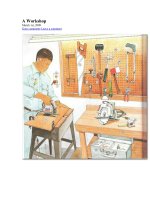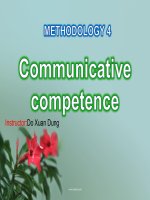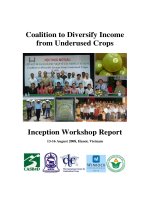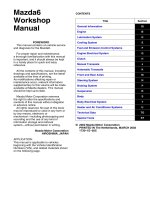competence workshop
Bạn đang xem bản rút gọn của tài liệu. Xem và tải ngay bản đầy đủ của tài liệu tại đây (407.19 KB, 36 trang )
COMPETENCE BASED
TEACHING
Workshop
The Planning of
Didactic Projects
COMPETENCE BASED
TEACHING
What is «didactic»?
2
COMPETENCE BASED
TEACHING
What matters is NOT to possess
knowledge…
but what you
DO with it!
3
COMPETENCE BASED
TEACHING
COMPETENCE
4
COMPETENCE BASED
TEACHING
COMPETENCE
COMPETENCE
5
COMPETENCE BASED
TEACHING
Competence
WHICH?
WHEN?
WHY?
6
COMPETENCE BASED
TEACHING
Life Skills
•For permanent learning
•For managing information
•For managing situations
•For coexistence
•For life in society
Marked by SEP
COMPETENCE BASED
TEACHING
FOR PERMANENT LEARNING
Involves students’ ability to:
•Learn
•Assume and direct their own learning
throughout their lives
•Integrate writing and math skills
•Mobilize the various cultural
knowledge, science and technology to
understand reality.
COMPETENCE BASED
TEACHING
FOR MANAGING INFORMATION
• To search, evaluate, categorize and
arrange information
• To think, reflect, argue and express
critical thinking
• To analyze, synthesize and use
information
•
COMPETENCE BASED
TEACHING
SKILLS FOR MANAGING SITUATIONS
Are
Are those
those related
related to:
to:
••The
The possibility
possibility of
of organizing
organizing and
and designing
designing
projects
projects of
of life,
life, considering
considering various
various aspects
aspects such
such
as
as social,
social, cultural,
cultural, environmental,
environmental, economic,
economic,
academic
academic and
and affective
affective
••Taking
Taking the
the initiative
initiative to
to carry
carry them
them out
out
••Time
Time management
management
••Making
Making decisions
decisions and
and assuming
assuming the
the
consequences
consequences
••Handling
Handling failure
failure and
and disappointment.
disappointment.
COMPETENCE BASED
TEACHING
FOR COEXISTENCE
Implies:
Implies:
••Interacting
Interacting cordially
cordially with
with others
others and
and with
with
nature
nature
••Communicating
Communicating effectively
effectively
••Teamwork
Teamwork
••Agreeing
Agreeing and
and negotiate
negotiate with
with others
others
••Managing
Managing emotions
emotions
••Developing
Developing personal
personal identity
identity
••Recognizing
Recognizing and
and appreciating
appreciating the
the elements
elements of
of
the
the ethnic,
ethnic, cultural
cultural and
and linguistic
linguistic diversity
diversity
COMPETENCE BASED
TEACHING
Life in Society
They
They relate
relate to:
to:
••The
The ability
ability to
to decide
decide and
and act
act with
with justice
justice critical
critical
of
of the
the values
values and
and social
social norms
norms and
and cultural
cultural
••Proceed
Proceed in
in favor
favor of
of democracy,
democracy, peace,
peace, respect
respect
for
for the
the law
law and
and human
human rights
rights
••Participate
Participate considering
considering ways
ways to
to work
work in
in society,
society,
governments
governments and
and enterprises,
enterprises, individual
individual or
or
collectively
collectively
••Act
Act with
with respect
respect to
to cultural
cultural diversity;
diversity;
••Combat
Combat discrimination
discrimination and
and racism
racism
••Show
Show aa sense
sense of
of belonging
belonging to
to our
our culture,
culture, our
our
country
country and
and the
the world.
world.
COMPETENCE BASED
TEACHING
BASIC LIFE SKILLS also include
MULTISENSORY
LEARNING
13
COMPETENCE BASED
TEACHING
MULTIPLE INTELLIGENCES
•Visual Spatial
•Logical Mathematical
•Verbal Linguistic
•Bodily Kinesthetic
•Musical
•Naturalist
•Interpersonal
•Intrapersonal
COMPETENCE BASED
TEACHING
THEORY OF MULTISENSORY LEARNING
Studies show the capacity of retention of the
average student:
30%
20%
50%
80%
+
+
15
Intelligence
Verbal /
Linguistic
COMPETENCE BASED
TEACHING
Mathematical/
Logical
Strengths
Preferences
Learns best through
Writing, reading, memorizing
Write, read, tell stories, Hearing and seeing words,
dates, thinking in words, telling talk, memorize, work at speaking, reading, writing,
stories
solving puzzles
discussing and debating
Math, logic, problem-solving,
reasoning, patterns
Question, work with
numbers, experiment,
solve problems
Musical
Interpersonal
Intrapersonal
Naturalistic
Books, tapes, paper diaries, writing tools,
dialogue, discussion, debated, stories, etc.
Working with relationships and Things to think about and explore, science
patterns, classifying,
materials, manipulative, trips to the
categorizing, working with the planetarium and science museum, etc.
abstract
Maps, reading charts, drawing, Draw, build, design,
Working with pictures and
mazes, puzzles, imagining
create, daydream, look colors, visualizing, using the
Visual / Spatial
things, visualization
at pictures
mind's eye, drawing
Bodily /
Kinesthetic
Needs
Athletics, dancing, crafts, using Move around, touch
Touching, moving, knowledge
tools, acting
and talk, body language through bodily sensations,
processing
LEGOs, video, movies, slides, art, imagination
games, mazes, puzzles, illustrated book, trips
to art museums, etc.
Role-play, drama, things to build, movement,
sports and physical games, tactile experiences,
hands-on learning, etc.
Picking up sounds,
remembering melodies,
rhythms, singing
Sing, play an
instrument, listen to
music, hum
Rhythm, singing, melody,
Sing-along time, trips to concerts, music
listening to music and melodies playing at home and school, musical
instruments, etc.
Leading, organizing,
understanding people,
communicating, resolving
conflicts, selling
Talk to people, have
friends, join groups
Comparing, relating, sharing,
interviewing, cooperating
Recognizing strengths and
weaknesses, setting goals,
understanding self
Work alone, reflect
pursue interests
Working alone, having space,
reflecting, doing self-paced
projects
Understanding nature, making
distinctions, identifying flora
and fauna
Be involved with
nature, make
distinctions
Working in nature, exploring
living things, learning about
plants and natural events
Friends, group games, social gatherings,
community events, clubs, mentors/
apprenticeships, etc.
Secret places, time alone, self-paced projects,
choices, etc.
Order, same/different, connections to real life
and science issues, patterns
COMPETENCE BASED
TEACHING
Some suggestions to develop
each intelligence:
VISUAL SPATIAL:
COMPETENCE BASED
TEACHING
•Make a “collage”
•Design a catalogue, a logo, greeting cards, post cards,
•Illustrate a story
•Design a poster
•Drawings, paintings, etc.
•Use many colors
•Take pictures
•Use imagination and fantasy
•Mind maps
•Watch movies or videos
•Make maps and graphics
•Crossword puzzles, mazes, wordsearches
COMPETENCE BASED
TEACHING
LOGICAL - MATHEMATICAL:
•Analyze data
•Look for information
•Classify or categorize
•Compare y contrast
•Experiments
•Desciphering codes
•Working with patterns
•Number and organize facts
•Solving problems
•Number games
•Work with percentages
COMPETENCE BASED
TEACHING
VERBAL LINGUISTIC:
•Read a book and write a summary
•Write letters, articles
•Poems
•Autobiographies
•Instructions
•Tell stories, jokes, riddles
•Make a diary
•Crossword puzzles, wordsearches,
•Create a slogan
COMPETENCE BASED
TEACHING
BODILY KINESTHETIC:
•Represent concepts with movements and patterns
•Sign language
•Miming
•Role play
•Gestures
•Modeling
•Puzzles
•Video games that involve hand-eye coordination
•Physical exercise, sports
COMPETENCE BASED
TEACHING
MUSICAL:
•Write song lyrics
•Clap, hum, whistle to a melody
•Write a poem
•Play an instrument
•Sing a song in duet with a partner
•Investigate about musical instruments
•Learn how to read musical notes
•Change the words to a song,
•Listen to background music while working
COMPETENCE BASED
TEACHING
NATURALIST:
• Visit to the zoo, a farm, etc.
•Investigate natural phenomena
•Do solar system projects,
•Watch documentaries
•Observe and record changes in the weather, make a weekly
weather forecast, etc.
•Take pictures of nature
•Plant trees
•Read, invetigate & talk about environmental problems
COMPETENCE BASED
TEACHING
INTERPERSONAL:
•Team work
•Group discussions
•Presenting point of view
•Team presentation of a topic
•Interviews
•Help classmates
•Solving real and imaginary problems
•Planning events
COMPETENCE BASED
TEACHING
INTRAPERSONAL:
•Keep a diary
•Organize action plans
•Expressing feelings
•Categorize priorities
•Detect changes in mood and the reasons
•Silent reading
•Autobiographies
•Read books and write summaries

![[CEHV3] Ethical Hacking Workshop Presentation](https://media.store123doc.com/images/document/13/ly/za/medium_zas1367917374.jpg)







